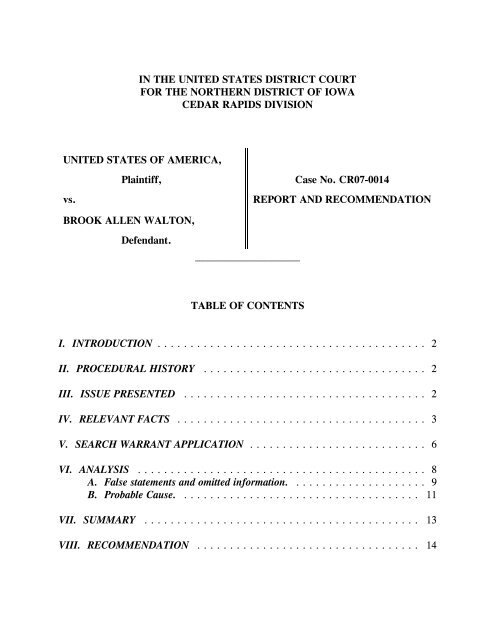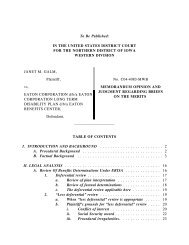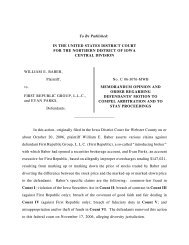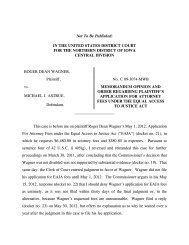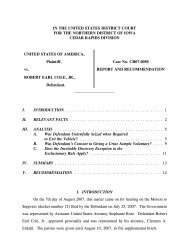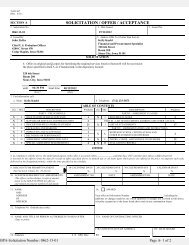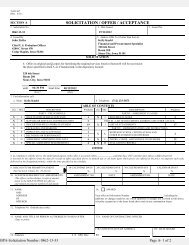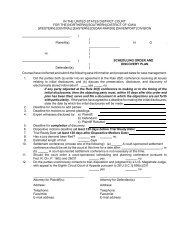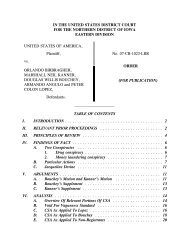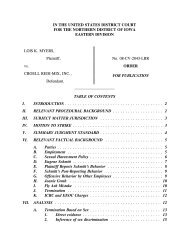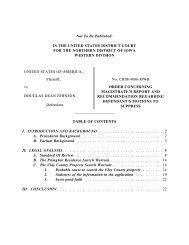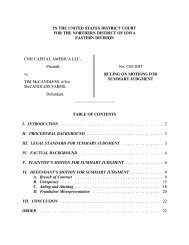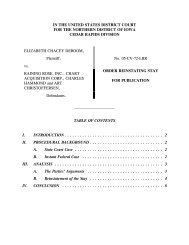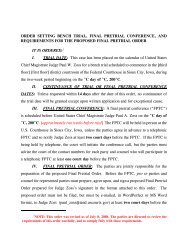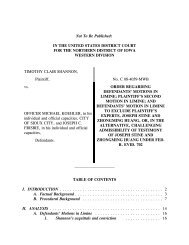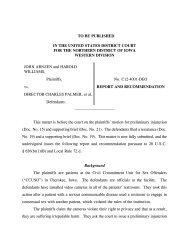Report and Recommendation - Northern District of Iowa
Report and Recommendation - Northern District of Iowa
Report and Recommendation - Northern District of Iowa
Create successful ePaper yourself
Turn your PDF publications into a flip-book with our unique Google optimized e-Paper software.
IN THE UNITED STATES DISTRICT COURT<br />
FOR THE NORTHERN DISTRICT OF IOWA<br />
CEDAR RAPIDS DIVISION<br />
UNITED STATES OF AMERICA,<br />
Plaintiff,<br />
Case No. CR07-0014<br />
vs.<br />
REPORT AND RECOMMENDATION<br />
BROOK ALLEN WALTON,<br />
Defendant.<br />
____________________<br />
TABLE OF CONTENTS<br />
I. INTRODUCTION ......................................... 2<br />
II. PROCEDURAL HISTORY .................................. 2<br />
III. ISSUE PRESENTED ..................................... 2<br />
IV. RELEVANT FACTS ...................................... 3<br />
V. SEARCH WARRANT APPLICATION ........................... 6<br />
VI. ANALYSIS ............................................ 8<br />
A. False statements <strong>and</strong> omitted information. .................... 9<br />
B. Probable Cause. .................................... 11<br />
VII. SUMMARY .......................................... 13<br />
VIII. RECOMMENDATION .................................. 14
I. INTRODUCTION<br />
On the 22nd day <strong>of</strong> June, 2007, this matter came on for hearing on the Motion to<br />
Suppress Evidence (docket number 16) filed by the Defendant on May 30, 2007. The<br />
Government was represented by Assistant United States Attorney Patrick Reinert.<br />
Defendant Brook Walton appeared personally <strong>and</strong> was represented by his attorney, Wallace<br />
Taylor. The hearing could not be completed during the time allocated on June 22, 2007<br />
<strong>and</strong>, therefore, was completed on June 29, 2007. 1 The parties were given until July 6,<br />
2007, to file additional briefs.<br />
II. PROCEDURAL HISTORY<br />
On March 7, 2007, Defendant Brook Walton was charged by Indictment (docket<br />
number 2) in two counts: Count 1 charges Defendant with possession <strong>of</strong> cocaine with<br />
intent to distribute within 1,000 feet <strong>of</strong> a school; <strong>and</strong> Count 2 charges Defendant with<br />
possession <strong>of</strong> cocaine. Defendant entered a plea <strong>of</strong> not guilty <strong>and</strong> trial was scheduled for<br />
July 2, 2007. Due to the pendency <strong>of</strong> the instant Motion to Suppress Evidence, however,<br />
the trial was continued <strong>and</strong> is now scheduled on August 27, 2007. (See docket number<br />
35.)<br />
III. ISSUE PRESENTED<br />
On July 1, 2005, Sgt. Harvey Hall <strong>of</strong> the Linn County Sheriff’s Office submitted<br />
an Application for Search Warrant to a Linn County magistrate, supported by an Affidavit<br />
identified as “Attachment A,” <strong>and</strong> a form referring to an informant, identified as<br />
“Attachment B.” (See Government’s Exhibit 1.) The Application <strong>and</strong> Affidavit bear the<br />
signature <strong>of</strong> Sgt. Harvey Hall <strong>and</strong> indicate that they were sworn to before the magistrate<br />
on July 1, 2005. The form referring to the informant (“Attachment B”) is unsigned. 2 In<br />
Daniel Tvedt.<br />
1 Also appearing on behalf <strong>of</strong> the Government on June 29 was Assistant United States Attorney<br />
2 The Court notes parenthetically that Government’s Exhibit 1 suggests that Attachment B consists<br />
<strong>of</strong> two pages, with the second page including a short narrative <strong>and</strong> a space for the affiant’s signature. In<br />
(continued...)<br />
2
paragraph 1 <strong>of</strong> the Endorsement on Search Warrant Application, the issuing magistrate<br />
indicated that the Court was relying on the “affidavit only.” In paragraph 2, however, the<br />
magistrate also indicated reliance on information supplied by a confidential informant, with<br />
the informant’s information appearing credible because “[s]worn testimony indicates this<br />
informant has given reliable information on previous occasions.” (See Government’s<br />
Exhibit 1.) Defendant claims that the assertions made by Sgt. Hall in support <strong>of</strong> the<br />
Application contain deliberate falsehoods or were made in reckless disregard for the truth.<br />
IV. RELEVANT FACTS<br />
On June 20, 2005, Trooper Michael McVey <strong>of</strong> the <strong>Iowa</strong> State Patrol was contacted<br />
by Desiree Walker regarding information which she possessed about Defendant Brook<br />
Walton. 3 According to Trooper McVey, he had never talked to Walker prior to that date<br />
<strong>and</strong> he did not know why she had contacted him. When Trooper McVey discovered the<br />
nature <strong>of</strong> the information, he asked Special Agent Greg Brugman <strong>of</strong> the <strong>Iowa</strong> Department<br />
<strong>of</strong> Narcotics Enforcement (“DNE”) to sit in on the interview.<br />
According to Trooper McVey, Desiree Walker told the <strong>of</strong>ficers that a large quantity<br />
<strong>of</strong> cocaine, jewelry, <strong>and</strong> money could be found in a safe in Defendant’s home. Walker<br />
also disclosed that she had been assaulted by Defendant’s girlfriend, Jenica Mullarkey.<br />
Walker told Trooper McVey that Defendant was present when Mullarkey assaulted her,<br />
but did not disclose that Defendant had previously assaulted her. 4 Trooper McVey checked<br />
2 (...continued)<br />
the Government’s Resistance to the Motion to Suppress filed on June 11, 2007, however, the second page<br />
<strong>of</strong> Attachment B was omitted. (See docket number 23.)<br />
3 At the time <strong>of</strong> hearing, McVey testified that he is now a special agent with the <strong>Iowa</strong> Division <strong>of</strong><br />
Criminal Investigation.<br />
4 In his post-hearing brief (docket number 47), Defendant argues that notwithst<strong>and</strong>ing his testimony<br />
at the hearing, Trooper McVey must have known <strong>of</strong> Defendant’s assault on Walker, citing a police report<br />
filed on May 24, 2006, nearly one year later. Initially, the Court notes that the police report (attached to<br />
Defendant’s Motion to Suppress Evidence <strong>and</strong> identified as Defendant’s Exhibit A) was not <strong>of</strong>fered into<br />
evidence at the time <strong>of</strong> hearing. Apparently, the report (docket number 16-3) was made belatedly so<br />
(continued...)<br />
3
to verify Defendant’s address, car registration, <strong>and</strong> whether he was on probation, but did<br />
not do any additional investigation. Trooper McVey advised Walker to file a report<br />
regarding the assault with the Cedar Rapids Police Department, which McVey testified<br />
Walker did the following day. 5<br />
Special Agent Greg Brugman confirmed that he met with Trooper McVey <strong>and</strong><br />
Desiree Walker. 6 Special Agent Brugman testified that Walker, who identified herself as<br />
Defendant’s former girlfriend, told the <strong>of</strong>ficers that she was assaulted by Jenica Mullarkey,<br />
whom she identified as Defendant’s current girlfriend. Special Agent Brugman could not<br />
recall any statements by Walker that she had been assaulted by Defendant. 7<br />
Special Agent Brugman testified that during this same period <strong>of</strong> time, he was<br />
working with a confidential informant by the name <strong>of</strong> Heather Faeth. According to Special<br />
Agent Brugman, Faeth made two controlled buys for him <strong>and</strong> he asked her to make a<br />
controlled buy from Defendant Brook Walton. On June 30, 2005, Special Agent Brugman<br />
received a telephone call from Sgt. Harvey Hall <strong>of</strong> the Linn County Sheriff’s <strong>of</strong>fice,<br />
4 (...continued)<br />
Walker could submit her medical bills for reimbursement by a victims’ compensation fund. She apparently<br />
also advised the <strong>of</strong>ficer on May 25, 2006, that she delayed filing a report because Trooper McVey <strong>and</strong> “a<br />
DEA agent” advised her that “they wanted her to wait in filing the report due to parole violations they were<br />
working on for Walton.” Defendant also notes in his Brief that in its Resistance to the instant Motion, the<br />
Government states that “Trooper McVey told Walker to report the incident [involving Jenica Mullarkey],<br />
as well as the assault by defendant, to the Cedar Rapids Police Department who would have jurisdiction<br />
over the <strong>of</strong>fense.” (See docket number 23-2 at 9.) The Court concludes, however, that the testimony <strong>of</strong><br />
Trooper McVey in this regard is credible <strong>and</strong> should be given more weight than the statement <strong>of</strong> Desiree<br />
Walker nearly one year later or the representations made by Government’s counsel.<br />
5 At the time <strong>of</strong> hearing, the Government <strong>of</strong>fered a “Clearance <strong>Report</strong>” by Detective George Aboud<br />
<strong>of</strong> the Cedar Rapids Police Department, dated July 4, 2005. (See Government’s Exhibit 2.) The Clearance<br />
<strong>Report</strong> refers to the “date <strong>of</strong> original report” as 6-21-05, but the original report was not <strong>of</strong>fered by either<br />
party at the instant hearing. A “supplemental report” regarding the incident, dated June 21, 2005, was<br />
attached to Defendant’s Brief (docket number 16-2) <strong>and</strong> identified as Defendant’s Exhibit B.<br />
6 Special Agent Brugman testified the meeting took place on June 21, 2005, while Trooper McVey<br />
testified the meeting took place on June 20, 2005.<br />
7 See fn. 4.<br />
4
indicating that Faeth was afraid to go through with the controlled buy. Sgt. Hall testified<br />
that Faeth came to him that day <strong>and</strong> reported that the “task force” wanted her to introduce<br />
an undercover <strong>of</strong>ficer to a dealer, but she was afraid that the <strong>of</strong>ficer would be recognized.<br />
During their meeting at the Sheriff’s Office, Faeth told Sgt. Hall about a safe at<br />
Defendant’s residence containing drugs, money, <strong>and</strong> jewels. Sgt. Hall’s report regarding<br />
that meeting <strong>and</strong> the subsequent search <strong>of</strong> Defendant’s residence was admitted into<br />
evidence as Defendant’s Exhibit F.<br />
Sgt. Hall testified that Heather Faeth had acted as an informant for the Sheriff’s<br />
Office since February 2005. Faeth provided information for two prior search warrants,<br />
one at the Roosevelt Hotel <strong>and</strong> one for a meth lab on 11th Street NE in Cedar Rapids. In<br />
addition, Faeth made controlled buys for law enforcement <strong>of</strong>ficers, including the DEA<br />
drug task force. According to Sgt. Hall, Faeth’s information was accurate <strong>and</strong> reliable in<br />
the past <strong>and</strong> he had no reason to disbelieve the information she was providing regarding<br />
Defendant.<br />
At the instant hearing, Defendant <strong>of</strong>fered a copy <strong>of</strong> the search warrant <strong>and</strong> return<br />
obtained by Sgt. Hall for a search <strong>of</strong> Leonard L<strong>and</strong>t’s apartment at the Roosevelt Hotel on<br />
February 24, 2005. (See Defendant’s Exhibit G.) The application was supported by<br />
information provided by Heather Faeth. Defendant notes that the search yielded only<br />
suspected drug residue. Sgt. Hall explained, however, that L<strong>and</strong>t always carried his drugs<br />
<strong>and</strong> money on his person <strong>and</strong> he was not present at the apartment during the search.<br />
Defendant also elicited testimony from Sgt. Hall that while four persons were<br />
arrested during the search <strong>of</strong> the meth lab on 11th Street NE, only two <strong>of</strong> those persons<br />
were prosecuted. Sgt. Hall testified that the other two persons were arrested for child<br />
endangerment <strong>and</strong> the county attorney subsequently decided to proceed “administratively,”<br />
rather than pursue criminal charges.<br />
On June 30, 2005 (the day she was meeting with Sgt. Hall), Heather Faeth was<br />
charged by Trial Information in state court with three counts: unlawful possession <strong>of</strong><br />
5
prescription drugs (Xanax), driving while under suspension, <strong>and</strong> possession <strong>of</strong> drug<br />
paraphernalia (hypodermic needles). 8 (See Defendant’s Exhibit D.) According to the Trial<br />
Information, the <strong>of</strong>fenses occurred on June 5, 2005. On August 3, 2005, the charges<br />
against Faeth were dismissed. (See Defendant’s Exhibit E.) Sgt. Hall admitted interceding<br />
with the assistant county attorney on Faeth’s behalf. According to Sgt. Hall, his request<br />
for consideration was related to Faeth’s earlier service in the meth lab search. Sgt. Hall<br />
denied that Faeth had ever been paid monetary compensation for information, but conceded<br />
that after she provided information regarding a prostitute in March 2005, money from the<br />
Sheriff’s Office was used to purchase a cell phone for Faeth <strong>and</strong> refill a prescription. 9<br />
V. SEARCH WARRANT APPLICATION<br />
As set forth above, the search warrant application was supported by “Attachment<br />
A” <strong>and</strong> “Attachment B.” Attachment A informed the issuing magistrate that on June 30,<br />
2005, Sgt. Hall made contact with “informant 05-141-01,” whom Hall identified at the<br />
instant hearing as Heather Faeth. The informant told Hall that “[a] large metal safe that<br />
would have in it a large sum <strong>of</strong> money, a large quantity <strong>of</strong> cocaine, <strong>and</strong> diamonds” could<br />
be found at 3737 Oakl<strong>and</strong> Rd NE. The informant also stated that “additional smaller<br />
quantities <strong>of</strong> cocaine, <strong>and</strong> other drug paraphernalia” could be found in the residence. The<br />
informant asserted that “[t]he individual at this residence was a Brook <strong>and</strong> that he was<br />
trafficking cocaine in larger quantities.”<br />
Sgt. Hall advised the issuing magistrate in Attachment A that he was familiar with<br />
3737 Oakl<strong>and</strong> Rd NE in Cedar Rapids as the home <strong>of</strong> Brook Walton. The magistrate was<br />
told that Walton “has a long record <strong>of</strong> crimes,” as enumerated in Attachment A.<br />
Attachment A further advised the issuing magistrate that Sgt. Hall met with Trooper<br />
Mike McVey on June 27, 2005, <strong>and</strong> was told that McVey had interviewed another<br />
8 The Trial Information was approved by the Court on June 30, 2005, but not filed with the Clerk<br />
<strong>of</strong> Court until July 1, 2005.<br />
9 Heather Faeth died <strong>of</strong> a drug overdose in August 2005.<br />
6
informant during the week <strong>of</strong> June 19, 2005 to June 25, 2005. According to Attachment<br />
A, that informant met with Trooper McVey <strong>and</strong> Agent Greg Brugman <strong>of</strong> the <strong>Iowa</strong> DNE,<br />
<strong>and</strong> described a gun safe at the residence <strong>of</strong> Brook Walton at 3737 Oakl<strong>and</strong> Rd NE, which<br />
“would contain drugs (cocaine in large quantities), money <strong>and</strong> jewelry.” The issuing<br />
magistrate was advised that “[t]his informant was not a tested informant.” Attachment A<br />
noted, however, that the information provided by the two informants was substantially the<br />
same.<br />
The issuing magistrate was further advised in Attachment A that informant 05-141-<br />
01 (Faeth) “has been used on several prior search warrants in the recent past (for the Linn<br />
County Sheriff’s Office) <strong>and</strong> those warrants have been successful in locating narcotics,<br />
drug paraphernalia <strong>and</strong> monies.” The magistrate was also advised that Walton had been<br />
in prison for prior drug trafficking <strong>and</strong> was “currently under Federal Parole Supervision.”<br />
Attachment B, consisting <strong>of</strong> two pages, included a checklist on the first page <strong>and</strong><br />
a short narrative on the second page. Referring to “CI# LCSO 05-141-01,” the magistrate<br />
was advised that the informant “has no motivation to falsify the information” <strong>and</strong> “has<br />
otherwise demonstrated truthfulness.” The magistrate was further advised that the<br />
informant had supplied information in the past on four occasions, which had helped supply<br />
the basis for two search warrants <strong>and</strong> had led to the making <strong>of</strong> four arrests. The magistrate<br />
was further advised:<br />
Informant 05-141-01 has been at the 3737 Oakl<strong>and</strong> Rd address<br />
<strong>and</strong> has seen the cocaine, drug paraphernalia, monies <strong>and</strong><br />
diamonds at the residence. The Informant has been [sic]<br />
provided information in the past <strong>and</strong> that information has been<br />
found to be correct in all aspects with the exceptions <strong>of</strong> the<br />
amounts <strong>of</strong> drugs present. Informant has been paid for part <strong>of</strong><br />
past information provided to the Linn County Sheriff’s Office.<br />
Informant has not been for all information that has been<br />
provided. I have known the informant for approximately 4<br />
months.<br />
7
As set forth above, the copy <strong>of</strong> Attachment B which was introduced at the instant<br />
hearing as part <strong>of</strong> Government’s Exhibit 1 was not signed.<br />
VI. ANALYSIS<br />
In his instant Motion to Suppress Evidence, Defendant claims that Sgt. Hall<br />
“intentionally, or with reckless disregard <strong>of</strong> the truth, presented false information in the<br />
affidavit for the search warrant, <strong>and</strong> the evidence seized on the basis <strong>of</strong> the warrant should<br />
be suppressed.” Specifically, Defendant argues that Attachment B falsely asserted (1) that<br />
the informant had no motivation to falsify the information, (2) the informant had supplied<br />
information in the past on four occasions, (3) the informant’s past information led to the<br />
making <strong>of</strong> four arrests, <strong>and</strong> (4) the informant had not given false information in the past.<br />
Furthermore, Defendant argues that material omissions from the Application for Search<br />
Warrant included (1) the circumstances surrounding the relationship between Defendant<br />
<strong>and</strong> Desiree Walker, <strong>and</strong> (2) that Heather Faeth had refused to attempt a controlled buy<br />
from Defendant.<br />
The seminal case in this regard is Franks v. Delaware, 438 U.S. 154 (1978).<br />
There, the United States Supreme Court concluded that if it is shown following a hearing<br />
that a false statement knowingly <strong>and</strong> intentionally, or with reckless disregard for the truth,<br />
was included by the affiant in the warrant affidavit, <strong>and</strong> if the false statement is necessary<br />
to the finding <strong>of</strong> probable cause, then the search warrant must be voided <strong>and</strong> the fruits <strong>of</strong><br />
the search excluded. Id. at 155-56. The same principle applies if material information is<br />
omitted from the application. United States v. Ketzeback, 358 F.3d 987, 990 (8th Cir.<br />
2004) (“Omissions likewise can vitiate a warrant if the defendant proves ‘first that facts<br />
were omitted with the intent to make, or in reckless disregard <strong>of</strong> whether they make, the<br />
affidavit misleading, <strong>and</strong>, second, that the affidavit, if supplemented by the omitted<br />
information, could not support a finding <strong>of</strong> probable cause.’”) (quoting United States v.<br />
Allen, 297 F.3d 790, 795 (8th Cir. 2002)).<br />
8
The st<strong>and</strong>ard to be applied in a Franks case was summarized recently by the Eighth<br />
Circuit Court <strong>of</strong> Appeals as follows:<br />
To prevail on a Franks claim, a defendant must show that:<br />
(1) the affiant knowingly <strong>and</strong> intentionally, or with reckless<br />
disregard for the truth, included false information in or<br />
excluded material information from the search warrant<br />
affidavit; <strong>and</strong> (2) the affidavit, excluding the false inclusion or<br />
including the missing material information, would not support<br />
a finding <strong>of</strong> probable cause. (citation omitted) Neither mere<br />
negligence nor an innocent mistake will, by themselves, void<br />
a warrant.<br />
United States v. Davis, 471 F.3d 938, 946 (8th Cir. 2006). Accordingly, the Court must<br />
determine whether Sgt. Hall intentionally, or with reckless disregard for the truth, included<br />
false information in the search warrant application or excluded material information from<br />
the application. If the first prong in the Franks test is met, then the Court must determine<br />
whether probable cause for the warrant would nonetheless exist after excluding the false<br />
information or including the omitted information.<br />
A. False statements <strong>and</strong> omitted information.<br />
In order to sustain his burden <strong>of</strong> pro<strong>of</strong> on the first prong in Franks, Defendant must<br />
establish by a preponderance <strong>of</strong> the evidence that there are false statements in the search<br />
warrant application <strong>and</strong> supporting attachments, or that there are material omissions from<br />
the same. United States v. Stropes, 387 F.3d 766, 771 (8th Cir. 2004). To prevail on a<br />
Franks claim based on omissions <strong>of</strong> fact, a defendant must prove “‘that facts were omitted<br />
with the intent to make, or in reckless disregard <strong>of</strong> whether they make, the affidavit<br />
misleading. . . .’” Id. (quoting United States v. Allen, 297 F.3d 790, 795 (8th Cir. 2002)).<br />
Turning to the facts in the instant action, Defendant first argues that Attachment B<br />
falsely stated that the informant “has no motivation to falsify the information.”<br />
Apparently, Defendant believes that in providing information for the search warrant, Faeth<br />
was motivated by the state charges which were filed at the same time as the search<br />
9
warrant. 10 There is no evidence, however, to sustain that belief. Sgt. Hall testified that<br />
his efforts on Faeth’s behalf regarding the state charges were related to her earlier service<br />
in obtaining a search warrant for a meth lab on 11th Street in Cedar Rapids. Sgt. Hall<br />
denied that Faeth received any consideration for the information which she provided<br />
regarding Defendant.<br />
Next, Defendant argues that the testimony established that Faeth has supplied<br />
information on six occasions in the past, rather than the four times identified by Sgt. Hall<br />
in Attachment B. Sgt. Hall explained that the four times referenced in the Attachment<br />
represent dealings which he had directly with Heather Faeth. In addition, Faeth had<br />
provided information to other law enforcement agencies on two occasions. Sgt. Hall did<br />
not include those instances since he was not a party to them. To the extent the assertion<br />
may be inaccurate, the Court concludes that it is not a material misrepresentation, United<br />
States v. Carpenter, 422 F.3d 738, 745 (8th Cir. 2005), <strong>and</strong> was an innocent mistake.<br />
Davis, 471 F.3d at 946.<br />
Similarly, Defendant argues that Sgt. Hall’s assertion that Faeth’s past information<br />
had led to the making <strong>of</strong> four arrests was misleading, since only two <strong>of</strong> the persons<br />
arrested were charged. Sgt. Hall testified that the child endangerment charges against the<br />
other two arrested individuals were h<strong>and</strong>led “administratively,” <strong>and</strong> the county attorney<br />
decided not to pursue criminal charges. The Court concludes that the assertion by<br />
Sgt. Hall regarding the number <strong>of</strong> arrests was neither false, nor was it materially<br />
misleading.<br />
Defendant argues that Faeth had given “false information in the past,”<br />
notwithst<strong>and</strong>ing the allegation in Attachment B. In support <strong>of</strong> his argument, Defendant<br />
cites the modest results <strong>of</strong> the search warrant executed at Leonard L<strong>and</strong>t’s apartment in the<br />
10 As noted in Part IV above, the Trial Information was signed on the same day that Faeth met with<br />
Sgt. Hall. The Trial Information was filed with the Clerk <strong>of</strong> Court on the following day, which is the same<br />
day that Sgt. Hall obtained the search warrant.<br />
10
Roosevelt Hotel. Sgt. Hall noted, however, that Attachment A to the L<strong>and</strong>t search warrant<br />
specifically indicated that the informant had observed methamphetamine <strong>and</strong> large sums<br />
<strong>of</strong> money “in LANDT’S possession.” (See Defendant’s Exhibit G.) Defendant failed to<br />
establish that Faeth had provided false information in the past. The Court concludes that<br />
the assertion made by Sgt. Hall in the instant action is accurate.<br />
In addition to the allegedly false statements, Defendant argues that Sgt. Hall omitted<br />
material information from the Application by failing to inform the issuing magistrate <strong>of</strong> the<br />
circumstances regarding the relationship between Desiree Walker <strong>and</strong> Defendant.<br />
Specifically, Defendant argues that the Application should have disclosed that Defendant<br />
had previously assaulted Walker. There is no evidence, however, that any <strong>of</strong> the <strong>of</strong>ficers<br />
were aware <strong>of</strong> that allegation prior to applying for the search warrant. Trooper McVey<br />
<strong>and</strong> Special Agent Brugman testified that while Walker described an assault by Jenica<br />
Mullarkey, she never disclosed an assault by Defendant.<br />
Finally, Defendant suggests that the magistrate should have been informed that<br />
Faeth had refused to attempt a controlled buy from Defendant. Even assuming the<br />
materiality <strong>of</strong> that fact, Defendant <strong>of</strong>fers no evidence to suggest that the omission was<br />
intended to make the Affidavit misleading, or was in reckless disregard <strong>of</strong> whether the<br />
omission made the Affidavit misleading. Allen, 297 F.3d at 795.<br />
In summary, the Court concludes that none <strong>of</strong> the affirmative assertions set forth<br />
in the attachments to the Application for Search Warrant are false, nor do the attachments<br />
omit material information. Even if one concludes that the attachments were false or<br />
misleading, however, there is no evidence that the misstatements were made knowingly<br />
<strong>and</strong> intentionally, or with reckless disregard for the truth. Mere negligence or innocent<br />
mistake are insufficient. Franks, 438 U.S. at 171.<br />
B. Probable Cause.<br />
As set forth above, the Court has concluded that Defendant failed to prove by a<br />
preponderance <strong>of</strong> the evidence that Sgt. Hall knowingly <strong>and</strong> intentionally, or with reckless<br />
11
disregard for the truth, included false information in or excluded material information from<br />
the search warrant affidavit. Accordingly, the first prong <strong>of</strong> Franks has not been met <strong>and</strong><br />
it is unnecessary to consider the second prong. Nonetheless, to assist the <strong>District</strong> Court<br />
in the event the Court finds that the first prong <strong>of</strong> Franks has been satisfied, the Court will<br />
also address the second prong relating to probable cause.<br />
In order to justify suppression <strong>of</strong> the evidence, the Court must determine that the<br />
affidavit, excluding the false information or including the missing material information,<br />
would not support a finding <strong>of</strong> probable cause. Davis, 471 F.3d at 946. In other words,<br />
Defendant must establish that if the false information were excluded, then probable cause<br />
would not exist; or if the material omissions were included, then it would have been<br />
impossible to find probable cause. Stropes, 387 F.3d at 771 (citing United States v.<br />
Mathison, 157 F.3d 541, 548 (8th Cir. 1998)).<br />
According to Defendant’s argument, the issuing magistrate should have been told<br />
about the impending charges against Faeth, that Faeth had supplied information on six<br />
prior occasions (rather than four), <strong>and</strong> that the four arrests made, based in part on<br />
information supplied by Faeth, resulted in only two persons being charged. In addition,<br />
Defendant would have the magistrate informed that the information relating to the search<br />
warrant at the Roosevelt Hotel resulted in the seizure <strong>of</strong> only drug residue. Also,<br />
Defendant believes the magistrate should have been told that Defendant had previously<br />
assaulted Desiree Walker (although that information was unknown to law enforcement at<br />
that time) <strong>and</strong> that Heather Faeth had refused to attempt a controlled buy from Defendant.<br />
With those modifications, the magistrate would have been advised that Heather<br />
Faeth provided information to law enforcement <strong>of</strong>ficers on additional prior occasions <strong>and</strong><br />
that the county attorney had elected not to pursue charges against two <strong>of</strong> the persons<br />
arrested. The magistrate would have been told that Faeth reported Leonard L<strong>and</strong>t carrying<br />
large amounts <strong>of</strong> drugs <strong>and</strong> money, but that since he was not found in his apartment at the<br />
time <strong>of</strong> the search, only residue <strong>of</strong> drugs was located. In addition, the magistrate would<br />
12
have been told that Faeth had recently been arrested on state charges, although there is no<br />
indication that a “deal” had been reached regarding resolution <strong>of</strong> those charges in exchange<br />
for information against the Defendant.<br />
The changes advocated by Defendant all go to the credibility <strong>of</strong> the informants.<br />
That is, none <strong>of</strong> the changes relate to the substantive information provided to the<br />
magistrate regarding the probability that evidence <strong>of</strong> Defendant’s criminal activity could<br />
be found at his residence. The Court believes that even with the changes advocated by<br />
Defendant, the issuing magistrate could nonetheless conclude that probable cause existed<br />
for the issuance <strong>of</strong> a warrant. “Probable cause to issue a search warrant exists when an<br />
affidavit in support <strong>of</strong> the warrant sets forth sufficient facts to establish that there is a ‘fair<br />
probability that contrab<strong>and</strong> or evidence <strong>of</strong>’ criminal activity will be found in the particular<br />
place to be searched.” Davis, 471 F.3d at 946 (citing Illinois v. Gates, 462 U.S. 213<br />
(1983)). In this case, two independent informants provided nearly identical information<br />
at about the same time. Even with the changes to the Application urged by Defendant, the<br />
magistrate could conclude that the information was credible <strong>and</strong> probable cause existed for<br />
the issuance <strong>of</strong> a search warrant.<br />
VII. SUMMARY<br />
In summary, the Court concludes that Defendant has failed to meet his burden <strong>of</strong><br />
proving by a preponderance <strong>of</strong> the evidence that the Application for Search Warrant <strong>and</strong><br />
attachments contain false information. Similarly, the evidence does not support a finding<br />
that material information was excluded from the search warrant application <strong>and</strong><br />
attachments. Even if one concludes that the Application <strong>and</strong> supporting attachments<br />
misrepresented the truth, however, there is no evidence that Sgt. Hall acted knowingly <strong>and</strong><br />
intentionally, or with reckless disregard for the truth, in attempting to mislead the<br />
magistrate. Mere negligence or innocent mistake is not enough. Finally, the objections<br />
made by Defendant go to the credibility <strong>of</strong> the informants <strong>and</strong> not to the substantive facts<br />
underlying the Application for Search Warrant. Even with the proposed changes, the<br />
13
Court believes that the issuing magistrate could find the informants credible <strong>and</strong> the<br />
allegations supportive <strong>of</strong> probable cause. Therefore, the Court believes that the Motion<br />
to Suppress should be denied.<br />
VIII. RECOMMENDATION<br />
For the reasons set forth above, I respectfully recommend that the <strong>District</strong> Court<br />
DENY Defendant’s Motion to Suppress Evidence (docket number 16).<br />
The parties are advised, pursuant to 28 U.S.C. § 636(b)(1)(B), that within ten (10)<br />
days after being served with a copy <strong>of</strong> these proposed findings <strong>and</strong> recommendation, any<br />
party may serve <strong>and</strong> file written objections with the <strong>District</strong> Court.<br />
DATED this 9th day <strong>of</strong> July, 2007.<br />
________________________________<br />
JON STUART SCOLES<br />
United States Magistrate Judge<br />
NORTHERN DISTRICT OF IOWA<br />
14


